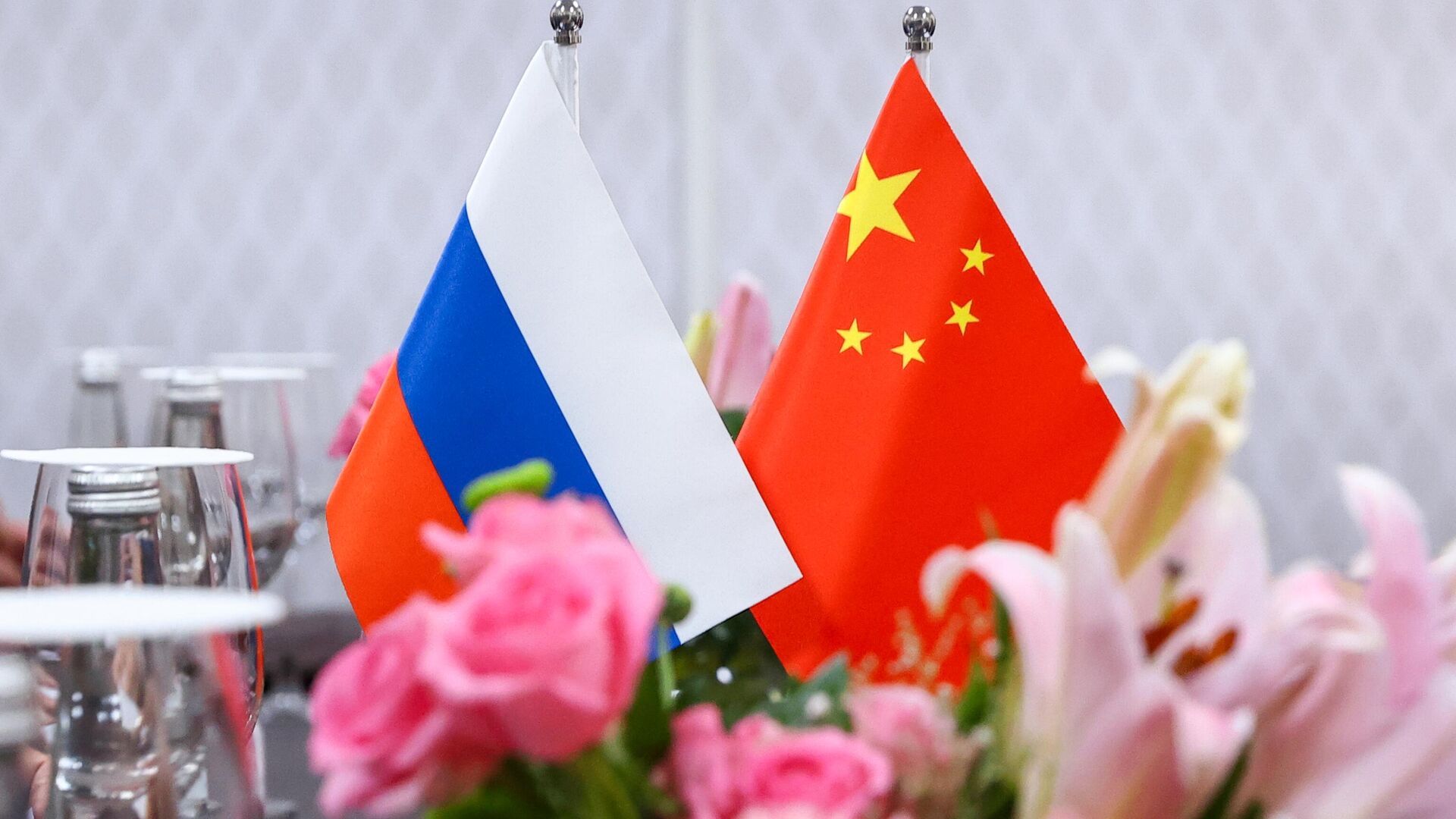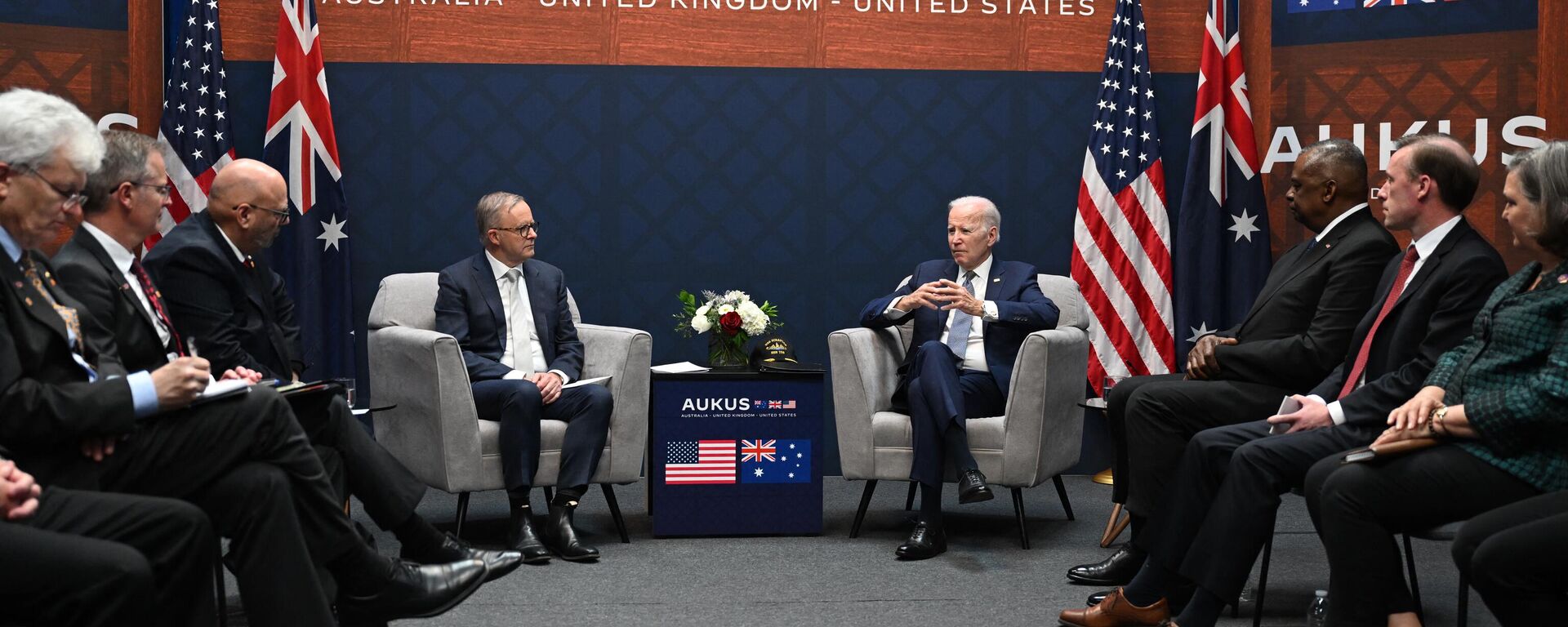https://sputnikglobe.com/20230321/joint-russo-chinese-statement-us-biowarfare-activities-aukus-submarines-prospects-of-nuclear-war-1108661395.html
Joint Russo-Chinese Statement: US Biowarfare Activities, AUKUS Submarines & Prospects of Nuclear War
Joint Russo-Chinese Statement: US Biowarfare Activities, AUKUS Submarines & Prospects of Nuclear War
Sputnik International
Moscow and Beijing have issued a joint statement on a number of poignant geopolitical issues, making this move amid the ongoing visit by Chinese President Xi Jinping to Russia.
2023-03-21T19:25+0000
2023-03-21T19:25+0000
2023-03-21T19:34+0000
world
russia
china
joint statement
https://cdn1.img.sputnikglobe.com/img/07e7/03/02/1107957856_0:160:3073:1888_1920x0_80_0_0_9145663f511acb01921b9e30df1bce08.jpg
The two world powers have declared their intent to help protect one another’s “core interests,” such as “sovereignty, territorial integrity, security and development.”US Chemical Weapons and Biological Military ActivitiesChina and Russia have insisted that the United States should step up the process of eliminating its chemical weapon stockpiles, pointing out that the US is the only signatory of the Chemical Weapons Convention who has not yet done so.Moscow and Beijing have also voiced their “serious concern” about the “military biological activities” the US carries out both at the American soil and beyond its borders.Stating that these activities “pose a serious threat to the security of other states and entire regions,” Russia and China demanded that the US should “provide clarifications on this matter” and refrain from conducting activities that contradict the Biological and Toxin Weapons Convention.US Designs for Global Defense Missile SystemRussia and China said that they are concerned by the United States’ attempts to establish a global missile defense system and to deploy elements of said system in various corners of the world, coupled with Washington’s “build-up of potential in precise non-nuclear weapons for conducting a disarming strike and other strategic capabilities.”They also expressed concerns about the United States’ “aspiration to deploy ground-based missiles, intermediate-range and shorter-range missiles in the Asia-Pacific and European regions and transfer them to their allies."AUKUS & Nuclear SubmarinesMoscow and Beijing voiced their concerns about the plans of the US, the UK and Australia – members of the trilateral military pact AUKUS – to build nuclear submarines.“The parties strongly urge the members of this partnership to strictly fulfill their obligations to non-proliferation of weapons of mass destruction and their means of delivery, to maintain regional peace, stability and development in the region," the Sino-Russian joint statement said.No Nuclear WarIn their statement, Russia and China firmly insisted that nuclear war must be allowed to occur and that there would be no winners in such conflict."Underlining the importance of the joint statement by the leaders of the five nuclear-weapon states on the prevention of nuclear war and the prevention of an arms race, the sides reiterate that a nuclear war cannot be won and must never be unleashed," they declared.Moscow and Beijing have reaffirmed their obligations under the Treaty on the Non-Proliferation of Nuclear Weapons, which they described as the “cornerstone of the international mechanisms for nuclear disarmament and the international regime for the non-proliferation of nuclear weapons.”They also pledged to continue coordinating efforts to “preserve and strengthen” said treaty “in the interests of maintaining international peace and security."African Union’s Accession to G20, WTO ReformBoth Russia and China stated they support the accession of the African Union to the G20.Moscow and Beijing stressed that they are “determined to strengthen coordination within the G20 and other multilateral mechanisms” in order to “improve global economic governance in a fair and rational manner so that it better reflects the structure of the world economy, which includes increasing representation and giving greater voice to emerging market economies and developing countries.”They also expressed intent to ramp up cooperation on “issues of supporting a multilateral trading system based on WTO rules and combating trade protectionism, which manifests itself, among other things, in the establishment of illegitimate unilateral restrictions on trade,” and to “strengthen dialogue on the WTO agenda, including its reform in order to increase the role of the WTO in the global economic governance."Fukushima Radioactive WaterRussia and China expressed their concern regarding Tokyo’s plans to dump into the ocean the contaminated water that accumulated at the Fukushima-1 nuclear power plant after the nuclear disaster at the facility back in 2011.Both parties insisted that Japan should “show transparency in contacts with adjoining countries, other interested states, international agencies, and, among other things, hold comprehensive consultations on this issue."
https://sputnikglobe.com/20230315/aukus-dividing-asia-us-uk-australian-leaders-reveal-details-of-disputed-nuclear-submarine-deal-1108385272.html
russia
china
Sputnik International
feedback@sputniknews.com
+74956456601
MIA „Rossiya Segodnya“
2023
Sputnik International
feedback@sputniknews.com
+74956456601
MIA „Rossiya Segodnya“
News
en_EN
Sputnik International
feedback@sputniknews.com
+74956456601
MIA „Rossiya Segodnya“
Sputnik International
feedback@sputniknews.com
+74956456601
MIA „Rossiya Segodnya“
us military biological research, aukus nuclear submarines, nuclear war risk
us military biological research, aukus nuclear submarines, nuclear war risk
Joint Russo-Chinese Statement: US Biowarfare Activities, AUKUS Submarines & Prospects of Nuclear War
19:25 GMT 21.03.2023 (Updated: 19:34 GMT 21.03.2023) Moscow and Beijing have issued a joint statement on a number of poignant geopolitical issues, making this move amid the ongoing visit by Chinese President Xi Jinping to Russia.
The two world powers have declared their intent to help protect one another’s “core interests,” such as “sovereignty, territorial integrity, security and development.”
US Chemical Weapons and Biological Military Activities
China and Russia have insisted that the United States should step up the process of eliminating its chemical weapon stockpiles, pointing out that the US is the only signatory of the Chemical Weapons Convention who has not yet done so.
Moscow and Beijing have also voiced their “serious concern” about the
“military biological activities” the US carries out both at the American soil and beyond its borders.
Stating that these activities “pose a serious threat to the security of other states and entire regions,” Russia and China demanded that the US should “provide clarifications on this matter” and refrain from conducting activities that contradict the Biological and Toxin Weapons Convention.
US Designs for Global Defense Missile System
Russia and China said that they are concerned by the United States’ attempts to establish a global missile defense system and to deploy elements of said system in various corners of the world, coupled with Washington’s “build-up of potential in precise non-nuclear weapons for conducting a disarming strike and other strategic capabilities.”
They also expressed concerns about the United States’ “aspiration to deploy ground-based missiles, intermediate-range and shorter-range missiles in the Asia-Pacific and European regions and transfer them to their allies."
AUKUS & Nuclear Submarines
Moscow and Beijing voiced their concerns about the plans of the US, the UK and Australia – members of the trilateral military pact AUKUS – to build nuclear submarines.
“The parties strongly urge the members of this partnership to strictly fulfill their obligations to non-proliferation of weapons of mass destruction and their means of delivery, to maintain regional peace, stability and development in the region," the Sino-Russian joint statement said.
In their statement, Russia and China firmly insisted that nuclear war must be allowed to occur and that there would be no winners in such conflict.
"Underlining the importance of the joint statement by the leaders of the five nuclear-weapon states on the prevention of nuclear war and the prevention of an arms race, the sides reiterate that a nuclear war cannot be won and must never be unleashed," they declared.
Moscow and Beijing have reaffirmed their obligations under the
Treaty on the Non-Proliferation of Nuclear Weapons, which they described as the “cornerstone of the international mechanisms for nuclear disarmament and the international regime for the non-proliferation of nuclear weapons.”
They also pledged to continue coordinating efforts to “preserve and strengthen” said treaty “in the interests of maintaining international peace and security."
African Union’s Accession to G20, WTO Reform
Both Russia and China stated they support the accession of the African Union to the G20.
Moscow and Beijing stressed that they are “determined to strengthen coordination within the G20 and other multilateral mechanisms” in order to “improve global economic governance in a fair and rational manner so that it better reflects the structure of the world economy, which includes increasing representation and giving greater voice to emerging market economies and developing countries.”
They also expressed intent to ramp up cooperation on “issues of supporting a multilateral trading system based on WTO rules and combating trade protectionism, which manifests itself, among other things, in the establishment of illegitimate unilateral restrictions on trade,” and to “strengthen dialogue on the WTO agenda, including its reform in order to increase the role of the WTO in the global economic governance."
Fukushima Radioactive Water
Russia and China expressed their concern regarding Tokyo’s plans to dump into the ocean the contaminated water that accumulated at the Fukushima-1 nuclear power plant after the
nuclear disaster at the facility back in 2011.
Both parties insisted that Japan should “show transparency in contacts with adjoining countries, other interested states, international agencies, and, among other things, hold comprehensive consultations on this issue."



